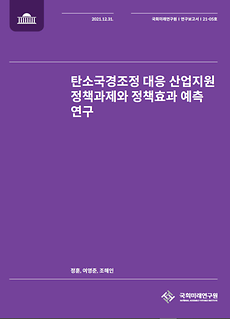
To respond to the accelerated climate crisis, the world is aiming to transition to a carbon-neutral society. The transition to a carbon-neutral society is a large and difficult task that requires extensive transformation of the fossil fuel-based economic and social system that has driven the development of modern human society. If we do not develop a thorough plan to guide this transition, not only will we lose trust in the international community, but the national economy will also suffer.
In particular, the introduction of the Carbon Border Adjustment Mechanism (CBAM), which was recently announced by the European Union (EU), heralds a change in the international trade order. This is expected to have a significant impact on the Korean economy, which is highly dependent on exports, and hinges on major industries that emit large amounts of greenhouse gas. Not only is the steel industry affected, as it is expected to apply CBAM from 2023, but the scope of CBAM is likely to expand in the future. This is why we have to preemptively respond to CBAM in order to ensure the competitiveness of our export industries.
Accordingly, the National Assembly Futures Institute (NAFI) has analyzed the impact of the introduction of CBAM on domestic industries by calculating the amount of additional burden on domestic industries following its implementation. NAFI subsequently proposed policy measures to support industries as they respond appropriately. The study found that the amount of additional burden on the domestic industry could reach trillions of won if the EU CBAM is fully introduced in 2030. The full introduction of CBAM here means that CBAM would be applied up to Scope 3 for all industries. It was also confirmed that the additional cost burden caused by the full introduction of CBAM can lead to declines in major macroeconomic indicators such as GDP, social utility, and investment.
However, it was also confirmed that the faithful implementation of the existing energy transition, as well as policies to support industry – such as R&D subsidies – can reduce the burden on industries and restore the economic indicators that have fallen. Through these results, we can see how urgent and important the response to CBAM is, and how important it is to design and implement effective policies.